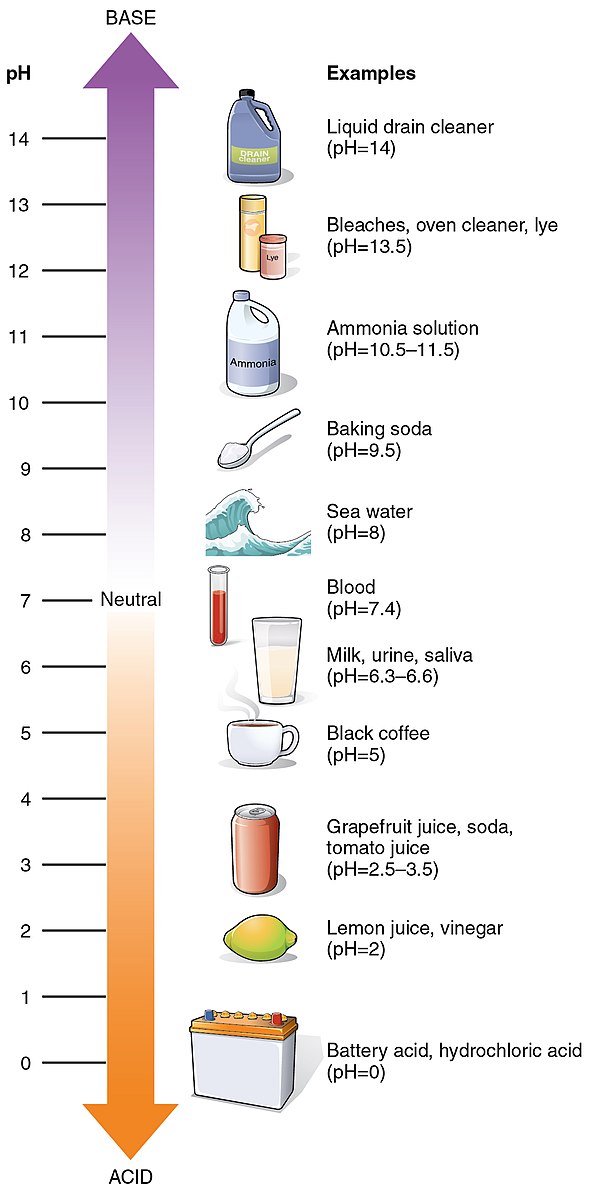The pH value of diatomaceous earth in water can vary depending on the specific type of diatomaceous earth and the method of preparation. Generally, natural and calcined powders have a pH range of 5 to 10, while flux-calcined powders have a pH range of 8 to 11. When diatomaceous earth is boiled with water for an hour and then filtered, the pH of the resulting filtrate can be measured.
Understanding Diatomaceous Earth
Diatomaceous earth is a natural powder made from the fossilized remains of tiny, aquatic organisms called diatoms. It is known for its filtering properties, as it is insoluble in water, acids, and dilute alkalis. Diatomaceous earth is often used in gardening and agriculture as a soil amendment to raise the silica content of the soil and provide broad pest resistance around plant roots.
The pH Range of Diatomaceous Earth
 Image source: OpenStax College
Image source: OpenStax College
The pH range of diatomaceous earth in water is generally neutral to slightly alkaline, falling between 5 and 10. This makes it a versatile material that can be used in a variety of applications without significantly altering the pH of the surrounding environment.
Natural and Calcined Powders
Natural and calcined powders of diatomaceous earth have a pH range of 5 to 10 when measured in water. This means that they are generally neutral to slightly alkaline, making them suitable for use in a wide range of applications.
Flux-Calcined Powders
Flux-calcined powders of diatomaceous earth have a slightly higher pH range, typically falling between 8 and 11. This means that they are more alkaline than natural and calcined powders, which may need to be considered when using them in certain applications.
Diatomaceous Earth as a Soil Amendment
When using diatomaceous earth as a soil amendment, it is important to consider the pH of the soil and the potential impact of diatomaceous earth on nutrient availability. Some sources suggest that diatomaceous earth can have a slight alkalizing effect on soil, which may affect the availability of certain nutrients.
Recommended Application Rates
To use diatomaceous earth as a soil amendment, it is recommended to mix it into the soil at a rate of 15 to 20 percent by volume for indoor potting soils, or 10 to 15 percent by volume for landscape soils. These rates can help increase water holding capacity, homogenize moisture content, and provide more plant available water, while also reducing watering needs and promoting root growth.
Monitoring Soil pH
If you are concerned about the pH of diatomaceous earth in water, it is recommended to test the pH of your soil before and after adding diatomaceous earth to ensure that it is within the desired range for your plants. You can also adjust the pH of your soil or water as needed using pH adjusting products or techniques.
Conclusion
In summary, the pH of diatomaceous earth in water can vary depending on the specific type of diatomaceous earth and the method of preparation. When used as a soil amendment, diatomaceous earth can have a slight alkalizing effect on soil, but this is generally not a cause for concern at the recommended application rates. To ensure optimal plant growth and nutrient availability, it is important to test the pH of your soil and adjust as needed.
References
- FAO. (2000). DIATOMACEOUS EARTH. Retrieved from https://www.fao.org/fileadmin/user_upload/jecfa_additives/docs/Monograph1/Additive-151.pdf
- THCFarmer. (2011). Diatomaceous Earth. Retrieved from https://www.thcfarmer.com/threads/diatomaceous-earth.40231/
- Rollitup. (2011). Diatomaceous earth & ph. Retrieved from https://www.rollitup.org/t/diatomaceous-earth-ph.452347/
- ResearchGate. (2021). Change in pH of a diatomite solution in the process of deionization. Retrieved from https://www.researchgate.net/figure/Change-in-pH-of-a-diatomite-solution-in-the-process-of-deionization_fig3_343390116
- EP Minerals. (2017). Diatomaceous earth soil amendments, indoor gardening and hydroponics. Retrieved from https://blog.epminerals.com/diatomaceous-earth-indoor-gardening-and-hydroponics
